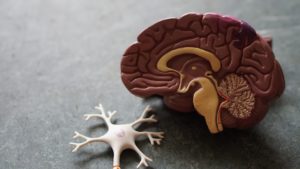Dementia refers to a decline in mental functions such as memory, language, and other thought processes that is severe enough to interfere with daily life. It is the result of damage to your brain cells that impedes their ability to communicate with each other.
 There are many forms of dementia, each one determined by its association with a particular type of brain cell damage in a particular region of the brain. Alzheimer’s, a brain disease, is the most common cause of dementia.
There are many forms of dementia, each one determined by its association with a particular type of brain cell damage in a particular region of the brain. Alzheimer’s, a brain disease, is the most common cause of dementia.
Dementia is progressive. The signs of it start slowly, and gradually get worse. Though it mostly affects older adults, some people can start exhibiting symptoms as early as in their forties or fifties. When the person affected is under the age of sixty-five, it is referred to as early-onset dementia.
Signs of early-onset dementia
Signs of early-onset dementia can be vague, and not always obvious. The following are some common warning signals.
Memory loss
Whereas it is normal for people, especially as they get older, to occasionally forget something and then remember it later, a person with early-onset dementia may forget things more often, or not remember them at all.
It is common, for example, for a person with early-onset dementia to do things such as leave the stove on, the tap running, forget something is cooking, or put things in weird places, such as the car keys in the freezer.
Difficulty performing routine tasks
People with early-onset dementia may have trouble concentrating or following directions, and often find it difficult to do simple tasks such as pay bills, follow a recipe, or put together a meal.
Disorientation
A person suffering from early-onset dementia may become confused about where they are or have trouble finding their way to a familiar place. They easily lose their train of thought and can become disoriented while driving.
Language problems
It is not unusual for most people, at one time or another, to have trouble finding the right word for something, but a person with early-onset dementia will tend to forget even simple words or substitute inappropriate ones.
 Personality and behavior changes
Personality and behavior changes
People with early-onset dementia may experience rapid mood swings for no apparent reason, become suspicious of the people around them, exhibit uncharacteristic changes in behavior such as acting in an uninhibited way, or become apathetic or withdrawn. They may also lose interest in activities they used to enjoy.
If you are experiencing two or more of these issues regularly, don’t put off seeing your doctor for a thorough screening. Time is of the essence and getting a prompt diagnosis is of key importance.
For one thing, it may not be dementia that is causing your issues. Many treatable physical and mental health conditions such as stress, depression, nutritional deficiencies, hormonal disorders, side effects of certain medications, brain tumors, vitamin deficiencies, strokes, or excess consumption of alcohol, can all exhibit similar symptoms. The sooner they are diagnosed, and treatment started, the more favorable the outcome is likely to be.
Lifestyle changes that may help slow the process
If you do have dementia, early detection will enable you to reap the maximum benefit from available treatment options such as medications that can temporarily stall the progression of symptoms.
These are only effective when started early on. The same holds true for the following non-drug-related lifestyle changes that research studies have suggested can also help slow the process of deterioration.
Regular exercise stimulates the brain’s ability to maintain old connections as well as make new ones, thus possibly delaying the onset of more severe symptoms in people showing signs of early-onset dementia.
Healthy diet
A growing number of studies suggest a strong link between inflammation and the signal processing that takes place in the brain. This inflammation can be reduced by adjusting your eating habits and cutting down on foods that have an inflammatory effect on your brain such as sugar, refined carbs, and alcohol
 Social engagement
Social engagement
Our brains cannot thrive in isolation. Therefore, it is important to stay active and socially engaged. You could become a volunteer, for example, or join a support group of people who share a similar experience to yours.
Mental stimulation
Studies have shown that people with early-onset dementia can delay the worsening of their symptoms by engaging in mentally stimulating activities such as doing word searches, playing board games, or discussing current events.
Challenge your brain by learning something new, or by doing things in different ways. For instance, try eating with the hand you don’t usually use occasionally, or explore new ways of expressing yourself, such as through painting, music, or writing.
Structure and routine
Keeping a calendar can help you remember upcoming events. Simplifying tasks by breaking them down into smaller steps can make them easier to perform. Reminder signs placed in strategic places can help you remember to do things like turning off the stove.
Counseling
A trained counselor can help you process your feelings and fears about the diagnosis of early-onset dementia, accept and adapt to the changes that are coming, and show you how to deal with emotions such as stress, anger, or anxiety.
A Christian Perspective
 God is always with you, and nothing can separate you from Him or His love. Dementia does not affect your standing with Him. You were created in His image and are therefore of great value.
God is always with you, and nothing can separate you from Him or His love. Dementia does not affect your standing with Him. You were created in His image and are therefore of great value.
Sometimes things are hard to understand, and we may question the goodness of God, but no matter how things may look, we must trust that He is in control and that He does have a good purpose and plan (Jeremiah 29:11).
If you have been saved from your sins, you can be assured of a better life to come. When your journey through this realm is over, God Himself will welcome you home and wipe every tear from your eyes (Revelation 21:4).
The following verses are promises you can count on to be true. Print them out on index cards and tack them up in places such as your bathroom mirror or refrigerator door. Read them aloud every chance you get. Keep repeating them until they become embedded in your soul.
And I am convinced that nothing can ever separate us from God’s love. Neither death nor life, neither angels nor demons, neither our fears for today nor our worries about tomorrow – not even the powers of hell can separate us from God’s love. No power in the sky above or in the earth below – indeed, nothing in all creation will ever be able to separate us from the love of God that is revealed in Christ Jesus our Lord. – Romans 8:38-39
Even when I walk through the darkest valley, I will not be afraid, for you are close beside me. Your rod and your staff protect and comfort me. – Psalm 23:4
Do not be afraid or discouraged, for the LORD will personally go ahead of you. He will be with you; he will neither fail you nor abandon you. – Deuteronomy 31:8
When you go through deep waters, I will be with you. When you go through rivers of difficulty, you will not drown. When you walk through the fire of oppression, you will not be burned up; the flames will not consume you. – Isaiah 43:2
My health may fail, and my spirit may grow weak, but God remains the strength of my heart; he is mine forever. – Psalm 73:26
If you have questions or would like to set up an appointment, please contact one of the faith-based counselors in the online counselor directory. We would be happy to meet with you to discuss practical techniques for dealing with early-onset dementia and help you manage the challenges you face while supporting and encouraging you along the way.
Resources:
Alzheimer’s Research and Prevention Foundation.
Bob Woods, Elisa Aguirre, Aimee E. Spector, Martin Orell (February 15, 2012). “Cognitive Stimulation to Improve Cognitive Functioning in People with Dementia,” Cochrane Library, published online DOI: 10.1002/14651858.CD005562.pub2
Mayo Clinic Staff, “Memory Loss: When to Seek Help,” MayoClinic.org
Melinda Smith, M.A., Lawrence Robinson, & Jeanne Segal, Ph.D., “Preventing Alzheimer’s Disease and Dementia – or Slowing its Progress” (March 2021), HelpGuide.org
“Brain Model”, Courtesy of Robina Weermeijer, Unsplash.com, CC0 License; “Doctor and Patient”, Courtesy of Getty Images, Unsplash.com, Unsplash+ License; “Holding Hands”, Courtesy of National Cancer Institute, Unsplash.com, CC0 License; “Sun on the Water”, Courtesy of David Cantelli, Unsplash.com, CC0 License






